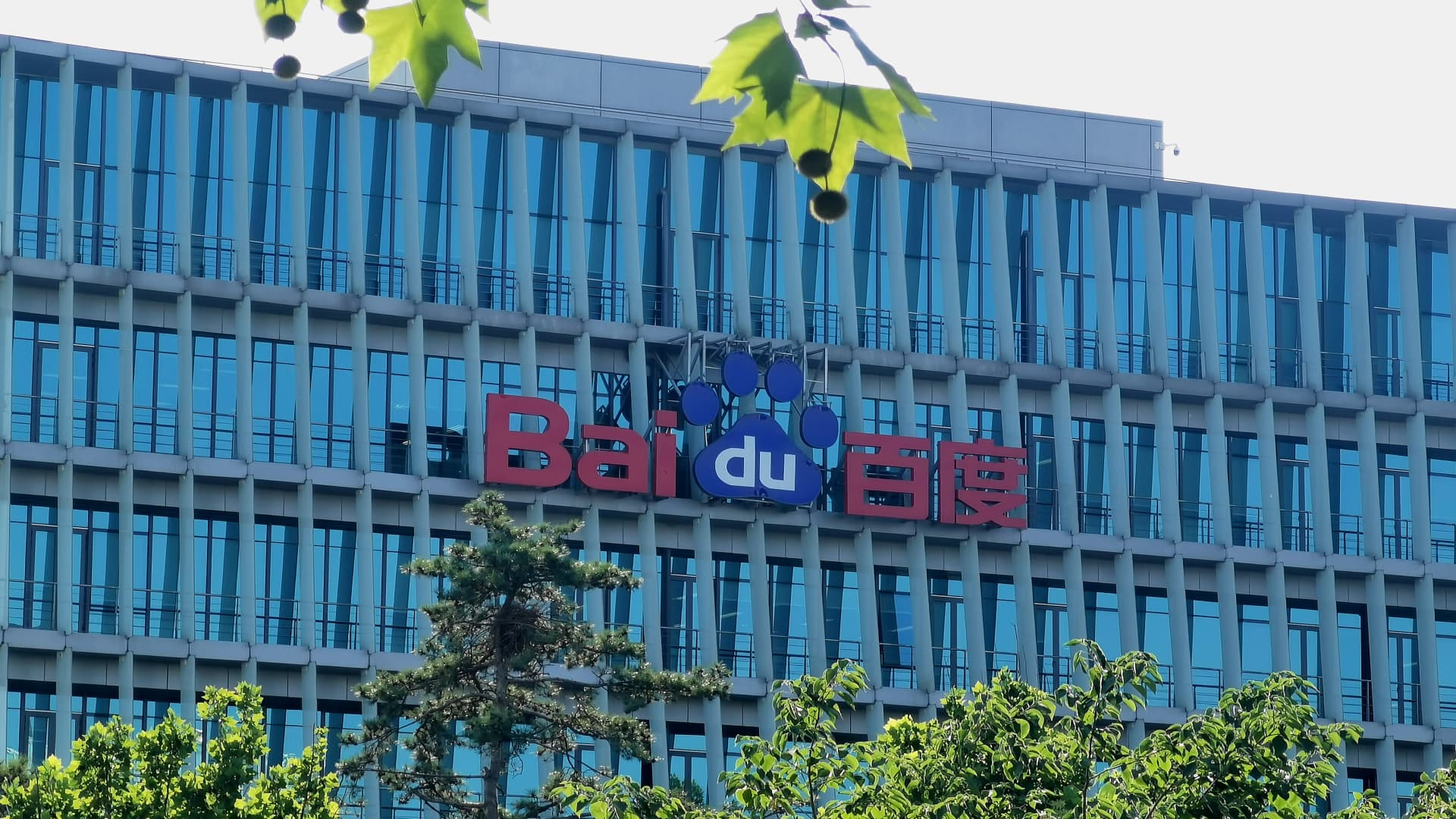
The Baidu Inc. logo is displayed on the company’s headquarters on July 3, 2019 in Beijing, China.
Wan Xiaojun | Visual China Group via Getty Images
Some analysts remain pessimistic on U.S.-listed Chinese stocks, warning the road ahead remains uncertain despite signs that they’re at less risk of being delisted from U.S. exchanges.
“Global investors may be jumping the gun a little bit. Everything is very, very premature right now,” said Shehzad Qazi, managing director of China Beige Book International.
March was a volatile month for Chinese stocks, which dived then surged as Beijing signaled more support for its firms listed overseas.
The MSCI China index spiked almost 24% for the month, turning around from a 25% tumble in the first half. This index tracks all Chinese stocks, including those listed in Hong Kong, the mainland and the U.S. Its top constituents are mostly tech stocks. CNBC’s China ADR index, which tracks U.S.-listed Chinese stocks, has jumped about 25% between mid March and April 1.
“I get the sense that a lot of investors right now are very happy with the progress but not really focusing on the fact that there’s a lot of uncertainty out there, a lot of unknowns,” Qazi told CNBC’s “Squawk Box Asia” Monday.
Harvey Pitt, who was chairman of the U.S. Securities and Exchange Commission from 2001 to 2003, added: “This is clearly an effort by the Chinese government to create an appearance that there will be more transparency. The real devil will be in the details.”
“The only question will be: are people who are investing now in Chinese companies doing so with their eyes wide open?” asked Pitt, who is now the CEO of consulting firm Kalorama Partners.
Earlier in March, shares of Chinese companies came under pressure when the U.S. Securities and Exchange Commission started identifying Chinese companies that could be delisted if they didn’t comply with audit requirements. Those included tech giant Baidu, biopharmaceutical firm BeiGene and fast food restaurant business Yum China.
On Friday, New York-listed Chinese stocks jumped further after a report that China is considering granting U.S. authorities full access to company audits. This would allow those companies to continue trading publicly in the U.S. The China Securities Regulatory Commission told CNBC that it told some accounting firms to consider preparing for joint inspections.
Over the weekend, Beijing also proposed revising confidentiality rules involving offshore listings, removing a legal hurdle to cooperation between both countries on audits, Reuters reported.
Qazi said: “Yes, there have been recent rule changes in China and they seem to suggest a positive step forward. But the truth is, at the end of the day, we don’t know the specifics of which companies will the SEC be able to audit according to U.S. rules and regulations.”
“So if the biggest players … Baidu, Alibaba, Tencent — are these companies going to open up their books to U.S. regulators for audits? Because if they don’t, you’re taking off a bunch of market capitalization,” he added.
Too early to call it a ‘dragon market run’
Other analysts also urged investors to stay cautious.
“Concrete policy action to stabilize China’s property market will likely be required to sustain this market rally. China’s zero-COVID policy and activity restrictions will also weigh on consumption and sentiment in the near-term, while its relationship with Russia means the threat of U.S. sanctions will hang over markets,” Seema Shah, chief strategist at Principal Global Investors, said in a note last week.
The property debt crisis has loomed over China’s economy. The Hong Kong exchange recently suspended trading in over 30 stocks that failed to report earnings on time, including Chinese developers Sunac China, Shimao and Kaisa.
“Although China may be resuming a market-friendly stance, it is still too early to call this a new dragon market run,” said Shah.
Kieran Tompkins of research firm Capital Economics added that the near-term outlook for growth continues to deteriorate, with high oil prices, renewed lockdowns and other factors threatening earnings growth.
“What’s more, even if domestic policymaking does become less of a concern for investors, the war in Ukraine and China’s alliance with Russia have ignited fears that the invasion will accelerate the process of decoupling of the country’s financial system with the US,” the assistant economist said in an April 1 note.
“As such, we suspect that China’s stock market will remain under pressure, even though its valuation relative to other MSCI equity indices is relatively low,” he added.




